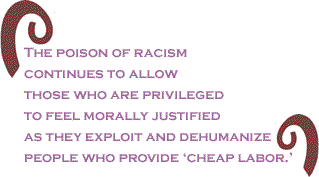
|
|||||||||||||||||||||
 |
|||||||||||||||||||||
 |
|
I am waiting to board the train in San Diego when I notice the Border Patrol agent making his way down our line. He stops by each person who looks “Latino” and asks them to present their legal documents. As the people standing next to me rummage for their identity papers, I stand by, angry, embarrassed and ashamed. In that moment, I don’t know what to say or do to protest. My mind suddenly travels
back in time. I “remember” what it must have been like during
slavery for Black people who made it to the North. If they had no
papers, they were doomed to live each
day in fear. If they were “legalized” by free papers, they
still always needed these documents, no matter who they were or
how old they were or how long they had lived in their community.
These papers were all that stood between them and being “deported”
and returned to their slave status.
My mind returns to the present. As the immigrant rights movement is building momentum nationwide, African Americans debate about where we should stand on immigration issues – shoulder to shoulder with immigrants, in direct opposition or on the sidelines. I believe that if we look just under the surface, we can see that our Black and Brown fates are deeply intertwined. As I am watching
a video, Rights
on the Line, about the phenomenon of the vigilante movement
along the U.S.- Mexico border, the Minutemen are on “night patrol,”
literally hunting the people trying to cross the border into the
U.S. Dressed in their military garb, with flashlights, walkie talkies
and weapons, the militia freely wield the privilege and the power
of race and their legal status. As I watch them rounding up frightened
men and women, hairs are raised on my arms.
Both Black and Brown are the targets of the racism used to justify unjust political, economic and social policy. Past and present, members of the exploited and marginalized communities are portrayed as different from and less than other Americans. The poison of racism continues to allow those who are privileged to feel morally justified as they exploit and dehumanize people who provide “cheap labor” and simultaneously blame them for their lot in life. Both Black and Brown share common dreams of work with dignity, a better life for our families and our children. Isn’t that why slaves escaped to the North and freed slaves initiated the Northern Migration? Isn’t that why people from other countries risk their lives to reach the U.S. today? We all desire the opportunity to build a life and to be respected and accepted members of the communities and country where we live. Black and Brown are not each other’s adversaries; we are natural allies. The economic and political forces that doomed millions of Africans to servitude and later to second class citizenship are the same forces responsible for unsustainable economic conditions in many foreign countries and the current migration of people to the U.S. They are the same forces responsible for conflict over jobs, wages, and economic opportunity in the U.S., a conflict that results in racism, discrimination and repressive legislation.
Because issues of labor, immigration and race are deeply enmeshed, we should be working together toward solutions that include all of us. We must (1) protect the rights and dignity of individuals who have come to the U.S. to work, (2) raise the labor standards and wages on both sides of the Border through reform of international trade policy, (3) protect local economies everywhere, rather than allow them to be overwhelmed by trade agreements favoring international corporations, (4) guarantee that every U.S. worker has the right and the protection to organize, and (5) we must organize! The border patrol officer is gone. Boarding the train in San Diego, I remember the words of Dr. Martin Luther King, Jr., “We are caught in an escapable network of mutuality, tied in a single garment of destiny.” Black faces…brown faces….human faces…. My heart feels what my mind all ready knows. The people from across the border are not the problem. A system of economic exploitation and racism is the problem. Rather than believing our interests are in conflict, Black and Brown must stand in unity and work together to transform this system. There is ultimately one movement – the movement for human dignity and opportunity – and I am a part of it. Eisha Mason is the Associate Regional Director for the Pacific Southwest Region of the American Friends Service Committee and co-founder of Soulforce Trainings. Contact her at: [email protected]. |
|
| Home | |
Your comments are always welcome. Visit the Contact Us page to send e-Mail or Feedback or Click here to send e-Mail to [email protected] e-Mail re-print notice
If you send us an e-Mail message we may publish all or part of it, unless you tell us it is not for publication. You may also request that we withhold your name. Thank you very much for your readership. |
|
| May 11, 2006 Issue 183 |
||||||||||||||
|
||||||||||||||
|
||||||||||||||
| Printer Friendly Version in resizeable plain text format | ||||||||||||||
 |
||||||||||||||
 |
||||||||||||||
 |
||||||||||||||
| |
||||||||||||||
| |
||||||||||||||






























